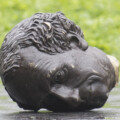In 2020, Germany was the fourth largest wine producer by volume in Europe, after Italy, France and Spain, and it was the ninth largest in the world after Chile. At 8.4 million hectolitres produced that year, Germany’s output is comparable to fifth ranked Argentina (10.8 million), sixth ranked Australia (10.6 million), and seventh ranked South Africa (10.4 million).
So why don’t we see more German wines on Canadian store shelves or restaurant wine lists?
A big reason can be found in another statistic: in 2020 German was the third largest importer of wine by dollar value in the world, after the United States and the U.K. (Canada is, for what it’s worth, the fourth.) If Federal Republic is the EU’s biggest importer of wine, it stands to reason that the Germans are consuming most of their wine themselves. It’s not like the Germans are desperate for hard currency and also stands to reason its well-to-do wine drinkers keep most of the good stuff for themselves.
In any event, a recent trip to my local provincial liquor control board retail outlet, showed something of the sad state of everyday German wines in this country. About a dozen wines were in the section of products that are stocked regularly, including a few well known brands whose heydays passed decades ago. All were quite sweet, low alcohol whites, though competitively priced. In the section of the store that features small allotments of wines that come and go every two weeks were a handful of Rieslings, again all on the sweet side.
Riesling it turns out makes up 95 percent of German exports to Canada. How much of that is sold in bottles of Blue Nun and Black Tower versus how much is sold as more expensive and drier food friendly wines, I don’t know. But if there’s growth to be had for German Riesling particularly and German wines generally in Canada, I expect it will be linked to the latter.
One man who is keen to see Canadians discover more German wines more often is Consul General Thomas E. Schulze, who was posted in Toronto just in time for the COVID crisis. Schulze, who was previously the German Ambassador to Croatia, is a wine enthusiast, and recently offered the backyard of his residence for German Wine Institute COVID-cool outdoor event honouring two Canadians who also work hard to get more of their compatriots to discover German Wines: Calgary retailer Al Drinkle of Metrovino and Waterloo, Ontario importer and agent Harry Drung, founder of HHD Imports.
Drinkle and Drung were being celebrated by the Consul General and a few dozen members of the wine trade and media for their induction as Canada’s first Riesling Fellows. The German Wine Institute selects new fellows from a different country every year in honour of those in the trade or media who have promoted the grape. Past honourees include popular English wine writers Hugh Johnson and Jancis Robinson, and Canadian expat and New York City restaurateur Paul Grieco.
Drung has always imported German Riesling since he began his career by bringing in two cases of 1975 Ockfener Bockstein Riesling Kabinett in the late 70s. In his remarks to the small crowd at the Consul General’s residence, Drung explained that, “All I can say is German Riesling is a passion of mine and I can’t get it out of my system,” adding a quote from U.K. wine writer, and Riesling Fellow, Stuart Pigott that “Riesling is a democratic wine”, that can be enjoyed at all levels and “keeps its promise.”
Drinkle also extinguished any doubt that he was a friend and ally of the Riesling grape, stating that he held “an unshakeable conviction that Riesling is the greatest wine” and that he was off the next day to Germany to see how this year’s vintage had fared. If this attendee and correspondent didn’t receive Riesling religion between Drinkle and Drung’s remarks, the wines sampled that evening sealed the deal, not least the Wiengut Dr. Loosen Ürziger Würzgarten Riesling Spätlese 1998 from the Mosel Valley.
The reason for the Riesling Fellowship is the final reason, I think, why we don’t see more German wines: the labels are tricky to discern for the uninitiated, especially if one doesn’t speak German. There are a lot of umlauts and long compound words. The Fellows, the German Wine Institute and sommeliers and wine trade across the country are there to help, though. German wines, especially Riesling, but also Pinot Noir aka Spätbugunder, enjoy popularity among the higher echelons of the hospitality industry and wine trade. Look for them on fine dining wine lists, where a sommelier can help with a selection.
If you’re in Ontario the LCBO ‘Destination’ program has store and an online channel for German wines, where dry, modern style labels can be bought online.
If you’re in Alberta, then Al Drinkle and his colleagues at Metrovino are there to recruit converts.
And wherever you are, The German Wine Institute, aka Wines of Germany, operates in Canada in both official languages and has an excellent resource website.
Recommended for You

Ben Woodfinden: Lament for an ‘elbows up’ nation

Falice Chin: The ‘wild and weird’ Calgary Stampede

‘A celebration of the spirit of Alberta’: Ryan Hastman on the political, economic, and cultural importance of the Calgary Stampede

Stephen Staley: Squid Game was a warning to itself




